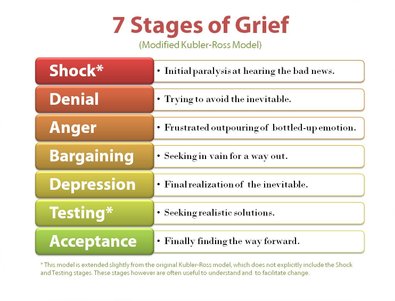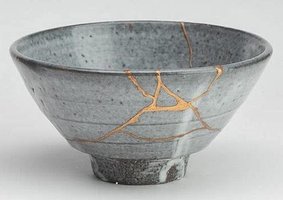
A perspective on grieving
The loss of a loved person, how dramatic, how traumatic. Is it really? Or is it just the natural progression of life … and death? There are various aspects to the re-orientation of the one’s that are left behind. Let’s take a closer look at it. Psychologist have analysed the grieving process into nice and neat little 5 – 7 steps which the dutiful obedient western citizen strives to follow to navigate through that stretch of life.
Shock, Denial, Anger, Bargain, Depression, Testing, Accepting and let me tell you straight: This is not a linear process! You can have all of these states of being within 30 seconds, all muddled up, adding to the confusion of how to reorganise what was once a well-oiled, routine and structure inclusive life.

Shock: No matter how prepared you are for the passing of a loved one, the actual moment when that human is returning into the spirit world is a shock for the system. There’s no way around it. Witnessing the exact moment or just hearing the news comes with a natural shock reaction – good or bad. It is a fundamental crossroad in one’s life, partnered with the deep knowing and undeniable fact that from now on everything will be totally different even if it stays the same.
Joe Dispenza speaks in great depth about the chemical cocktail that certain things in life trigger in our bodies and people definitely trigger chemical releases in other people. You have your hair standing in the back of your neck, get all warm and fuzzy feelings – you know what I’m talking about. Once a loved person transmutes, the stimulus for the chemical cocktail is no longer there. The body of the one that’s left behind inevitably goes into shock and withdrawal symptoms. The empty space in the bed, one plate less at dinner, no more a quick “I want to tell/show/share something with you” – what was once so familiar is no longer available. The shift from the “us” to the “me” has started.
Denial: Who wants to believe in resurrection miracles? Do I need to say more? No.
Anger: Should have, could have, if only. The blame game of self, the deceased, doctors, family members, society, God. This list is endless and somehow satisfying to channel all confusion on something else and with that trigger a chemical release in the body that hopefully makes the one that’s left behind feel better. Even if it’s just temporarily.
Bargaining: The ultimate state of being unreasonable, lost, confused.
Depression: The absolute ultimate stare of being unreasonable, lost, confused.
Testing: A vain, desperate attempt to pick up the pieces and create a new chapter in life which will hopefully be filled with love, laughter, happiness, hope and all the good trimmings. Unfortunately, in the early stages of the testing phase, absolutely everything is modelled and compared to what once was and never will be repeated again. Gone, done, dusted, finished. Picture it like a toddler trying to walk, falling over, going back to crawling, trying again and again.

Acceptance: A surrender to the new. Moving on, starting fresh and in best case scenario using the Japanese art of Kintsugi: Also known as kintsukuroi, is the Japanese art of repairing broken pottery by mending the areas of breakage with lacquer dusted or mixed with powdered gold, silver, or platinum, a method similar to the maki-e technique. As a philosophy, it treats breakage and repair as part of the history of an object, rather than something to disguise.

Loss of identity
Being part of the inner circle of someone that has moved back to spirit world leaves the ones that are left behind with a loss of identity. You are no longer the wife, daughter, friend, son, etc. or are you? Of course, you are still the wife, daughter, friend, son etc which is often totally misunderstood. Let me explain. The bond that existed in earthly life still exists in the afterlife. A father is a father, dead or alive. A friend is a friend, a son is a son. It is just our perception and social conditioning that leads us to believe that we no longer should love, fancy, admire, communicate with a dead person. Why so? We can choose to befriend anyone and anything, after all there are even people that speak to plants.
Of course, the day to day running of earthly affairs is taking new forms and shapes, however the way we feel about someone can absolutely stay the same. You can love someone who is far away deeply and completely. And as an added bonus you can love someone deeply and completely which is close by. Simultaneously. The heart knows no limit, boundaries, it moves effortlessly beyond time and space. So, the loss of identity mostly exists in the 3-dimensional world, in the practical, mundane day to day actions of life. Who takes out the trash, picks up the kids, brings in the money. On the higher levels of consciousness soul connection has the potential to continue to exist, depending on your belief systems and whether a soul contract has been fulfilled or not.
It is advisable to make changes to the identity of the still on earth residing humans, as death is final, the body will return to mother earth and the sooner a person adjusts the better it is. Energy and life continue, no matter what happens, therefore not adjusting will ultimately lead to a backwards progression. And rolling with the punches, carefully attending to the seed of greatness which lies within every tragedy, will step by step lead to a new comfort zone. A new and improved version of self, a new life where the unfamiliar becomes familiar again, leaving the past behind and looking with bright expectant eyes into the future.
Supporting a grieving human
How can you, as an innocent bystander, help a grieving person? In my opinion the most comforting words are “I hear you, I see you, I am here for you”. The most comforting actions are to make food, go shopping, clean the house and attend to ordinary day to day tasks.
Do not try to get into the grieving persons head and heart and ask too many questions that require a decision-making process. As a bystander it is tempting to foster drama by words like “I know how you feel” or “It must be awful, terrible, so sad”, “I’m so sorry for you” or “I can’t imagine how you feel”. Don’t get me wrong, compassion is very welcome and comforting but there is a fine line of projecting own grief onto someone that was closer to the one that transmuted.
You cannot possibly imagine how it feels to lose a companion, soul mate, best friend, loved parent. This process is different for everyone. And why on earth would you want to imagine all the pain and discomfort? What is it with the human addiction to pain, drama, suffering that we jointly beat the drum of misery and mourning instead of rejoicing in love, life, gratitude, remembering the good times? What would the world look like if we have more Gratitude counsellors than Grief counsellor? How much easier would be the shift into a new identity if society would give credit to the grieving person that they are actually processing the 7 stages with ease and grace?
And how many of you reading this automatically think: oh shame, she is in the denial phase? Give credit to the one who’s left behind capacity of embracing life and love quickly instead of insisting that being happy on the day of the memorial service will ultimately lead to a breakdown later. This kind of attitude and thinking is your projection of grief onto someone else, deal with your feelings first before trying to counsel or hold space for someone else. In my opinion it is absolute useless to have a misery competition of who has the most pain because a great human being decided to return home to spirit. Of course, there are good days and bad days, tears of joy and tears of sorrow. Each and every person has the opportunity in every day of their life’s to choose what do they want to focus on: Life or death? Different cultures have different rituals when it comes to death. Some throw themselves into a fixed time of mourning and misery, others rejoice because the limits of the physical flesh are no longer applicable to the soul. Who are we to judge who’s right and who’s wrong? Let your feelings be your guiding compass. After all time and space only exists in our limiting minds, the heart only knows infinity.

Be guided back to your strength and
create the life you desire